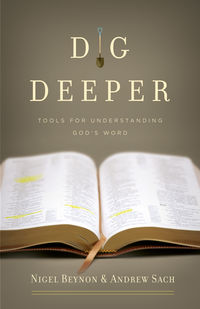Nigel Beynon and Andrew Sach: Dig Deeper
 Nigel Beynon and Andrew Sach, Dig Deeper: Tools for Understanding God’s Word (Wheaton, IL: Crossway, 2010), 160 pages, ISBN 9781581349719.
Nigel Beynon and Andrew Sach, Dig Deeper: Tools for Understanding God’s Word (Wheaton, IL: Crossway, 2010), 160 pages, ISBN 9781581349719.
Most non-Christians think that the Bible reduces to mere interpretation. So why do not more Christians focus on hermeneutics? This is a perennial question that needs to be resolved. Postmodernity, though not fully expressed yet, nevertheless is in full swing at the moment. In postmodernism, it seems, one literary item means one thing to one, and another thing to another. This situation was not the case with the Apostle Paul; rather, he postulated that there were both right ways and wrong ways to understand the Bible.
There are many joys of understanding the Bible correctly; for example, one can hear God’s voice directly; moreover, one can find the truth of the heavenly realm and how to get there; thirdly, one can find out what preoccupies God. This is a book that helps one to find the joy of the Bible, as well as how to understand the Bible. This is not a predefined, laid-out methodology of steps to take; rather, herein one learns principles to apply and thereby learn to do Bible study on their own. Do not leave it to the experts. One can and should do it for themselves.

Andrew Sach

Nigel Beynon
Reading the Bible is both a science and an art. As a science, it is both rigorous and disciplined. As an art, it is something you learn by doing, almost as if by catching something. Each chapter of this small book introduces you to a separate tool of Bible study and explains how it works. At the end of each chapter, there are “dig deeper” exercises that allow one to practice using the tools oneself. The authors deem the Bible a “divine book” (18). Moreover, they contend that one needs God’s Spirit within them in order to interpret and apply the Word in today’s environ. However, the Bible is also a human book; so then, we need to recognize that the Bible was written in a particular time, by particular people, and for particular circumstances. God speaks to us, though, through their particularity.
In applying the principles in this text to Biblical interpretation, one needs to keep in mind the purpose, context, structure, linked words within and beyond the text, vocabulary, tone and feel, repetition, inner textual allusions, genre, and the implications from the text. Herein, one finds suggestions to do just this. I would unhesitantly recommend this title for those Christians who desire to understand the Bible better, and thereafter apply it in their lives.
Reviewed by Bradford McCall
Publisher’s page: https://www.crossway.org/books/dig-deeper-tpb/
Category: Biblical Studies, Spring 2016


